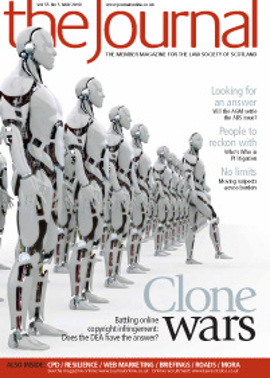Handover standoff

Recovery of documents
In Komori v Tayside Health Board [2010] CSOH 30; 2010 GWD 11-185, an action for damages for medical negligence, the pursuer sought recovery of certain documents relating to the investigation of her complaint under the NHS complaints system. The defenders argued that any such documentation fell within the privileged category of post litem motam. The motion was granted. The pursuer had not taken legal advice following the defenders’ report. Rather she had complained to the ombudsman. It was accordingly not apparent at that stage that litigation was in contemplation. The documentation had been prepared at the pursuer’s instigation and for her benefit, to give her the true position, as opposed to assisting the defenders in any litigation.
In McLean v Argyll and Clyde Health Board [2010] CSOH 54 (16 April 2010), Lord Brodie refused to approve certain calls in a specification of documents. His opinion contains a number of interesting observations. The first issue was whether the call was a “fishing diligence”. Lord Brodie referred to various authorities and observed that a call fell into this category if there were no averments to support the call, the averments were too vague, or the call was wider than necessary. In answer to an observation that the call was necessary to counter a response from the defenders, he observed that civil litigation in Scotland was adversarial and not inquisitorial. If the averment in response was irrelevant, it could be debated. If proof were allowed, specific calls might be approved at that stage. What the pursuer sought at present was to investigate whether it was advantageous to put certain matters at issue rather than reply adequately to his opponents’ averments.
Further, the call failed as being unduly wide, confused, and unintelligible. The granting of commission and diligence gave power to a commissioner to recover documents. The call defined the scope of what was sought. It was important that the haver knew what fell within that call. Similarly, particularly when the commissioner was required to take excerpts from documents, it was necessary to know what fell within the ambit of the call. In addition, the costs and disruption of producing what might be covered by the call had to be balanced against the value of the claim and the interests of justice generally.
Where the call was supported only by averments in an amendment received but not yet incorporated in a record, there was merit in waiting for this latter event particularly if there was real doubt as to the case the party was seeking to make. Finally, Lord Brodie observed that, logically, seeking that excerpts be taken from documents seemed inappropriate in the optional procedure. The purpose behind such a call is lost if the documents in full are produced to the party seeking them.
Actions ad factum praestandum
In the Inner House decision Smith v Stuart [2010] CSIH 29 (15 April 2010), one crave sought implement of the terms of an undertaking which were couched variously in the event of land being sold for certain purposes in one instance, and in the event of the land being sold for specified purposes and other conditions being satisfied. Lord Justice Clerk Gill observed that he had never heard of a court granting decree ad factum praestandum that was conditional on some event that might never occur. Something to be borne in mind when craving such a decree!
Joint and several liability
In Scottish Widows Services Ltd v Harmon/CRM Facades Ltd [2010] CSOH 42 (23 March 2010), Lord Drummond Young considered that a joint and several crave was perfectly competent in circumstances in which the breach of contract by each defender was averred to have contributed to a single loss by the pursuer. If this was the case, it was irrelevant that the defenders were parties to separate contracts, as each had contributed to a single loss by its breach of contract.
Caution for expenses
In McGregor v Alpha Airports Group plc [2010] CSOH 51 (8 April 2010) the pursuer, a party litigant who had previously been represented, had successfully sought the discharge of a proof. The matter came before Lord Bannatyne in respect of the expenses of that discharge and a motion that the pursuer find caution. Lord Bannatyne refused the defenders’ motion for expenses despite the fact that the discharge had been caused solely by the pursuer’s inability to proceed. His Lordship considered that the pursuer was very much a novice and displayed absolutely no knowledge of law or procedure. Justice would not have been served by finding the pursuer liable for these expenses.
On the issue of caution, it was clear that in the event of the defenders succeeding, there was no prospect of an award of expenses being met. The pursuer had a relevant and specific case on record. Lord Bannatyne, however, considered that he could take account of the evidence which the pursuer had at his disposal in considering his prospects of success. Against that background the pursuer had huge problems to surmount. In any event, the pursuer was indicating that he was going to amend his case, which raised the issue of whether this would be time barred. On that basis, caution was ordered.
Interest to become a party
In AXA General Insurance Ltd v Lord Advocate [2010] CSOH 36 (16 March 2010), 11 parties who claimed they had been diagnosed with pleural plaques sought leave to oppose the action at the instance of a number of insurance companies. Lord Uist considered the relevant rule of court, rule 58.8(2), which specified no criteria for concluding whether a party was “directly affected by the issue raised”. His Lordship considered that he had a wide discretion. The prospective defenders had an interest in the issue of the validity of the legislation subject to challenge. They were directly affected. However the court still had to consider whether discretion should be exercised in their favour. In light of the fact that only a limited number of parties were seeking leave to enter the process and the timetable of the litigation would not be affected, the parties were given leave.
Family actions
In A v B 2010 GWD 9-160 Sheriff Principal Young allowed an appeal against an interlocutor sisting an action by a grandfather for residence of his grandchild. The action had been sisted because the child was subject to adoption proceedings and there appeared to be nothing put before the court to support the grandfather’s claim for residence, or to suggest that the adoption proceedings should be delayed to allow the claim to be determined. The sheriff principal considered that by sisting the action, the sheriff had prejudged the grandfather’s claim and determined his claim, thus depriving him of his right to a fair hearing of an application competently presented.
Commercial actions
In UBC Group v Atholl Developments (Slacbuie) [2010] CSOH 21; 2010 GWD 9-149 Lord Glennie refused to sist for arbitration an action proceeding in the commercial court. In such a cause, there was no record and no automatic entitlement to adjustment. The pursuer should generally know their case and the likely line taken by the defender. If such an action was raised purely for reasons such as diligence on the dependence or securing interest on any future award, albeit the dispute was subject to an arbitration clause, the pursuer should make this clear when the action was raised. The pursuers’ note of issues in the present case had been silent regarding arbitration. The application came too late.
In another matter with a commercial bent, Lord Glennie determined in City of Edinburgh, Petrs [2010] CSOH 20 (2 March 2010) that the guarantors to a company which had been restored to the register had a right to be heard when the application for restoration was accompanied by a request that the period during which the company was struck off should not count to any prescription period for the purposes of a claim. Such an order directly affected the guarantors.
Actions for harassment
In Marinello v City of Edinburgh Council [2010] CSOH 17; 2010 SLT 349 the pursuer sought damages for harassment at the instance of his superiors. The acts complained of had occurred almost daily until 24 September 2005. The pursuer stopped work the next day. Eighteen months later one of the perpetrators saw the pursuer walking in the street and gestured to him. The pursuer sought to found on this last act to defeat a claim that his action was time barred. Lord Uist, observing that authorities relevant to the Moorov doctrine could be of relevance, decided that the last incident was so divorced in time, place, and circumstances from the others that it was not part of the same course of conduct. He sustained the time bar plea.
Professional practice
In Pottle v Van Overwaele [2010] CSIH 32 (21 April 2010) the Inner House allowed an appeal against a decree by default. The grounds of decision are, in my opinion, unremarkable, but a couple of observations are worth noting. First, their Lordships observe that a solicitor who undertakes to conduct litigation on behalf of a client, undertakes to take the proper procedural steps to allow the client’s dispute to be determined judicially. If the solicitor fails to do so and the client loses the opportunity to have the matter judicially determined, the client could have a defence to any action for recovery of fees. There is no need to show any financial loss.
The other observation related to the circumstances of the appeal itself. It was obvious that decree by default had been granted at a hearing of which the defender had had no intimation, due to the vagaries of the postal service. Their Lordships questioned why the pursuers had sought to maintain a decree not competently pronounced.
Summary causes
Perhaps not a matter of great significance, but in South Lanarkshire Council v McKenna, Glasgow Sheriff Court, 22 April 2010 Sheriff McCormick saw no problem in effect assigning a debate to ascertain in terms of summary cause rule 8.3(3)(c) whether a case was soundly based in law. Such a hearing was achieved by continuing the first hearing in terms of rule 8.2(3). All that is required is to turn a Nelson’s eye to “forthwith” in rule 8.3(3)(c).
I wholeheartedly agree with this approach.
Update
Since the last article AXA General Insurance Ltd, Petrs (March article) has been reported at 2010 SLT 179, Campbell v Glasgow Housing Association Ltd (January) at 2010 SLT 274, McFarlane v Thain (September) at 2010 SCLR 55, and Toner v Kean Construction (Scotland) Ltd (January) at 2010 SCLR 64.
In this issue
- Pro bono: making a difference to people's lives
- Goodbye sick note
- Like tears in the rain
- On level ground?
- Keeping tabs on the EU
- Counterstrike
- Supporting excellence
- The final roll of the dice
- Death and taxes
- Pick of the bunch
- Train to gain
- Law reform update
- Meeting the Deans
- Family feeling
- From the Brussels office
- Bank liaison back on track
- Resilience is the key
- Cast your net
- Outside the box
- Ask Ash
- Are you... experienced?
- Handover standoff
- Investing in dispute
- When Nature takes over
- Spilled milk?
- Armed with the law
- When is a "deed" not a deed?
- Blocked in
- Website review
- Book reviews
- Calling time on mora
- Raiders of the lost roads?






